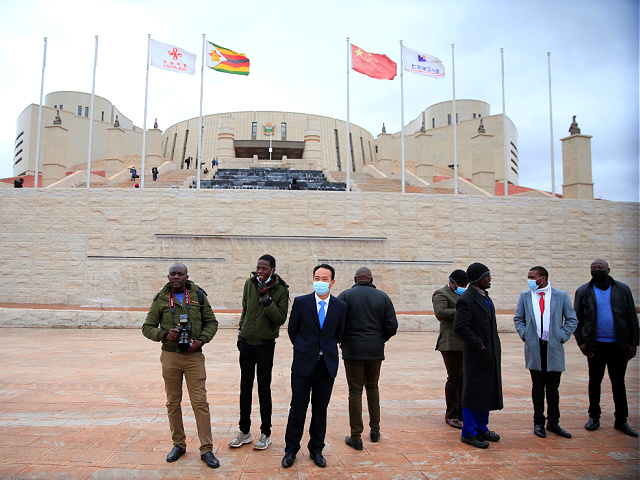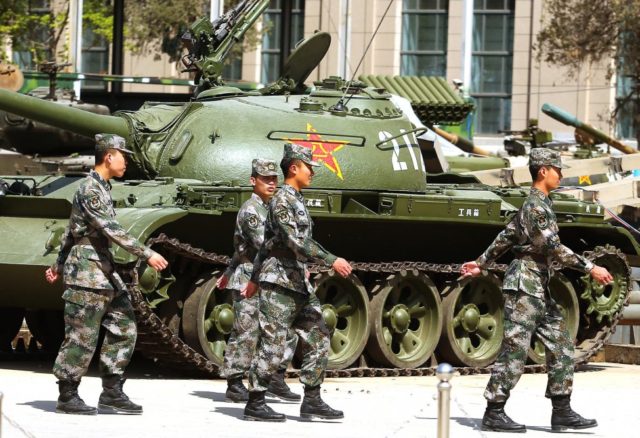A report by the Rand Corporation on the growing influence of China and Russia in Africa found that Beijing is not far behind Moscow in exporting weapons and private military contractors to African nations, especially those participating in China’s Belt and Road Initiative (BRI).
The report, entitled Mapping Chinese and Russian Military and Security Exports to Africa, tracked Chinese weapons sales to 17 African nations, plus deployments of private military and security contractors (PMSCs) to 15 countries. Five of those nations also receive military support from Russia, including Angola, the Central African Republic (CAR), Ethiopia, Mali, and Sudan.
Some of those countries are noted for using their imported weapons with enthusiasm, including Ethiopia’s vicious civil war over the past two years, Mali’s conquest by a military junta in 2020, and Sudan’s long history of using military force against restless citizens.
The RAND report noted the interesting detail that every one of the 15 African nations where Chinese PMSCs have been deployed has also received Russian PMSCs. These countries tend to be conflict zones whose governments are having difficulty combating long-running insurgencies, such as Libya, Nigeria, the Democratic Republic of Congo (DRC), and Malawi. Some are countries that have long relationships with Russia and the Soviet Union, or whose governments seek to hedge their military bets against reliance upon Western patrons, like Egypt.
RAND’s “heat map” of Russian and Chinese military influence found only a handful of African countries free of weapons and PMSCs from both of those authoritarian nations, including Tunisia, Western Sahara, Senegal, Gambia, Guinea-Biseau, Sierra Leone, Liberia, Ghana, Benin, Cameroon, and Namibia.
Russian contractors largely come from the infamous Wagner Group, which RAND noted has been “sanctioned internationally” for “atrocities and war crimes committed by its employees.”
The Wagner Group is shadowy, an “umbrella of many entities, most likely under the control and direction of Russian and government leaders,” while Chinese PMSCs are more disciplined, more clearly controlled by the central government, and more focused on defending China’s assets and investments in African countries.
RAND noted that Chinese PMSC’s tend to be much less violent than Russia’s mercenaries – they are usually “unarmed and engaged in defensive security functions rather than military operations.”
In short, China’s security troops are usually assigned to protect Chinese industrial and infrastructure projects, rather than providing mercenary muscle to put down insurgencies.
RAND senior researcher John Parachini told the South China Morning Post (SCMP) on Tuesday that weapons exports are “a means of influence.”
“The senior leaders of an arms-purchasing country are frequently involved in these transactions. Arms exports lead to contact with senior officials that can lead to other diplomatic and commercial interactions,” Parachini explained.
The SCMP noted that besides China and Russia, the other top-five arms suppliers to Africa are the United States, France, and Germany. Those Western nations enjoy “reputations for producing high-quality defense equipment” and “strong relations with certain countries due to historical relationships,” but China is expanding its influence by undercutting their prices with cheaper weapons. The Chinese might now see an opportunity to grab some African market share from Russia while the latter is preoccupied with its war in Ukraine.
Parachini noted that China has an advantage over Russia in that its customers do not have to worry about triggering sanctions imposed against Moscow by much of the Western world. Also, the battlefields of Ukraine have not exactly provided a ringing endorsement of the quality of Russian arms.
China’s big advantage over the U.S. and Europe is that its support does not come with any human rights strings attached. As Parachini put it, Beijing is quite comfortable with selling weapons to “countries with questionable human rights records,” and it has no problem with loaning them billions of dollars to make those purchases. Unlike the West and Russia, China is more likely to sell weapons to its clients – and loan them the money to make the buy – than to donate weapons directly to national governments.
The higher quality of Western equipment might not be a huge selling point to regimes that plan to turn their guns against terrorists, bandits, dissidents, and rebellious tribes, rather than fighting wars against near-peer adversaries. This appears to be reflected in China’s success at building military market share in sub-Saharan Africa, while Russia and the West have more loyal customers in North Africa.
A textbook example of China capitalizing on these advantages to build influence through military support is Zimbabwe. As a study from Peace Research Institute Oslo explained in November, China was happy to arm the noxious regime of longtime murderous dictator Robert Mugabe, who returned the favor by effusively thanking Beijing for assisting “our struggle to free ourselves from colonialism.”

People interact in front of Zimbabwe’s new parliament building on Mount Hampden Hill, Zimbabwe, on June 29, 2022. Zimbabwe’s new parliament building, constructed and fully funded by China as a gift to the southern African country, is now complete and ready for occupation. (Shaun Jusa/Xinhua via Getty Images
The Mugabe regime was largely isolated by the West with sanctions against Mugabe’s human rights violations, so China moved in with both military and industrial support.
Mugabe was finally toppled five years ago, but replacement dictator Emmerson Mnangagwa received his military training from Chinese instructors, as did many members of the ruling ZANU-PF party.
That kind of relationship builds a great deal of the diplomatic and economic “contacts” that RAND researcher John Parachini described – and contacts with the military are especially important in African nations, where the army tends to hold a great deal of political influence over the nominally civilian government, and coups are not uncommon.
The Peace Research Institute Oslo report noted that China usually sends a force of its military contractors to small African countries that bow to pressure from Beijing and stop recognizing Taiwan, as was the case with the Gambia and Sao Tome and Principe, and it gains influence even in Western-aligned nations by participating in multinational peacekeeping efforts like the one in Mali. This could create logistical, and perhaps even political, problems in African countries that have received incompatible equipment and training from the U.S., Europe, Russia, and China.

COMMENTS
Please let us know if you're having issues with commenting.